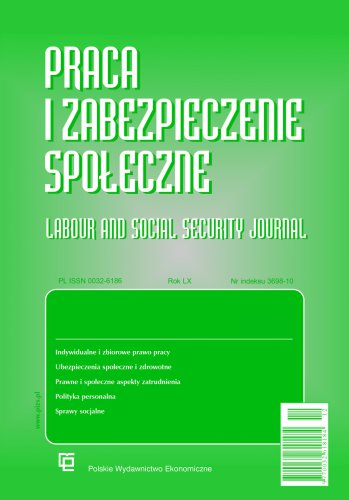Intention to employ an employee for a fixed-term as a prerequisite for concluding a probationary period contract?
The purpose of this article is to an alyse and assess the regulation introducing a new prerequisite for concluding an employment contract for a trial period, which will be the intention to employ an employee following lapse of the probation period. It was included in the law dated 8 March 2023 on amendments to the Labour Code and certain other laws, which aim is to implement into the Polish legal system the Directive of the European Parliament and of the Council (EU) 2019/1152 of 20 June 2019 on transparent and predictable working conditions in the European Union. The analysis leads to the conclusion that the legal norm resulting from the new Article 25 § 2(2) of the Labour Code, depriving the employer of the right to determine the duration for which a fixed-term employment contract will be concluded following lapse of the probationary period, especially in comparison to the maximum length of the probationary period and the obligation to justify the termination of the fixed-term employment contract upon notice, not only lacks justification in the provisions of Directive 2019/1152, but is also contrary to the aim of the probationary period employment contract and nature of the employment relationship.
References
Bibliografia/References
Duraj, T. (2013). Granice uprawnień kierowniczych w stosunku pracy. Zeszyty Prawnicze, (2).
Kubot, Z. (2022). Pojęcie kierownictwa pracodawcy. W: M. Matey-Tyrowicz, L. Nawacki, B. Wagner (Red.), Prawo pracy a wyzwania XXI w. Księga jubileuszowa Profesora Tadeusza Zielińskiego przygotowana z inicjatywy Instytutu Nauk Prawnych Polskiej Akademii Nauk, Biuro Rzecznika Praw Obywatelskich.
Liszcz, T. (2012). Swoboda umów w prawie pracy. W: M. Seweryński, J. Stelina (Red.), Wolność i sprawiedliwość w zatrudnieniu. Księga pamiątkowa poświęcona Prezydentowi Rzeczypospolitej Polskiej Profesorowi Lechowi Kaczyńskiemu, Wydawnictwo Uniwersytetu Gdańskiego.
Miętek, A. (2019). Swoboda umów i jej ograniczenia przy kształtowaniu treści stosunku pracy. C.H.Beck. Muszalski, W., Tomanek, A. (2021). W: W. Muszalski, K. Walczak (Red.), Kodeks pracy. Komentarz, Warszawa Legalis.
Nowak, P., Pawłucki, M. (2021). Koncepcja pracownika w dyrektywie PE i RADY (UE) 2019/1152 w sprawie przejrzystych i przewidywalnych warunków pracy w Unii Europejskiej a pojęcie pracownika w polskim prawie pracy, Praca i Zabezpieczenie Społeczne, (3). DOI: 10.33226/0032- 6186.2021.3.4
Pisarczyk, Ł. (2008). Ryzyko pracodawcy. Wolters Kluwer. Pisarczyk, Ł., Liszcz, T., Gersdorf (2017). 8.2.1.5. Umowa na okres próbny. W: K. W. Baran, G. Goździewicz (Red.) System Prawa Pracy. Tom II. Indywidualne prawo pracy. Część ogólna. Wolters Kluwer.
Prusinowski, P. (2012). Umowne podstawy zatrudnienia, Wolters Kluwer.
Rylski, M. (2017). Umowa na okres próbny po nowelizacji kodeksu pracy. Państwo i Prawo, (9).
Sobczyk, A. (2016). Umowa na okres próbny od 2016 r. Monitor Prawa Pracy, (1).
Sobota, A. (2013). „Jednorazowość” umowy na okres próbny, Studia Prawnicze i Administracyjne, (2).
Wagner, B. (1978). W sprawie elementów treści umowy o pracę. Państwo i Prawo, (8–9).

